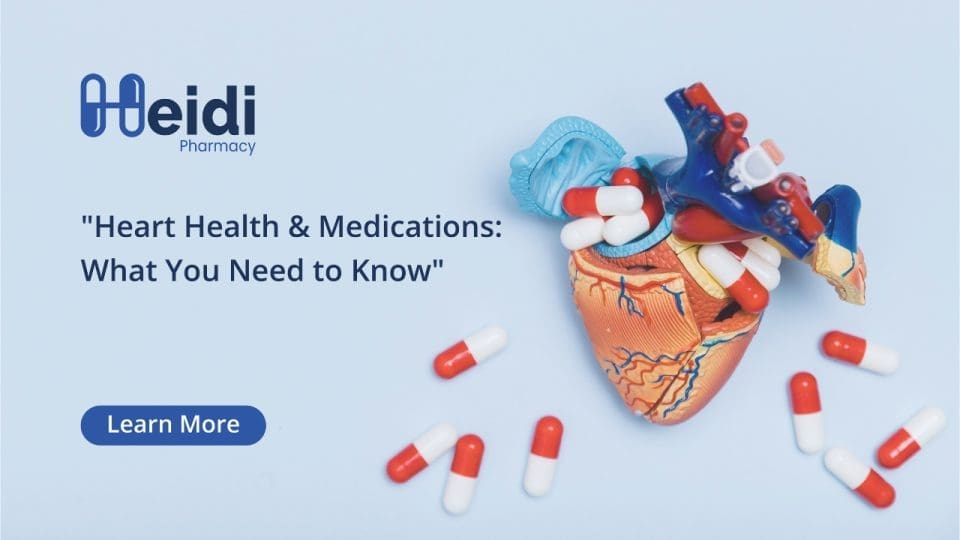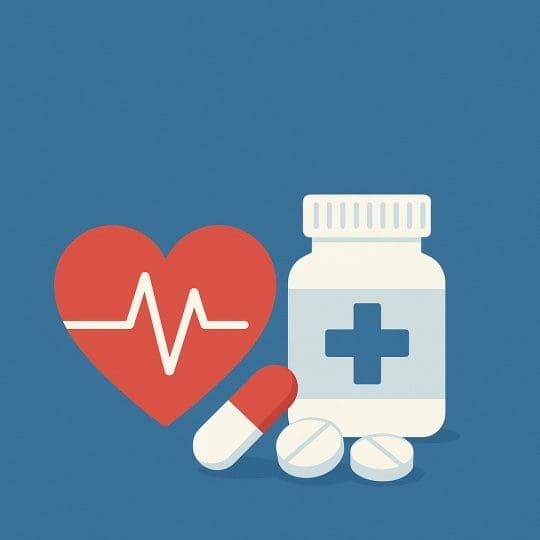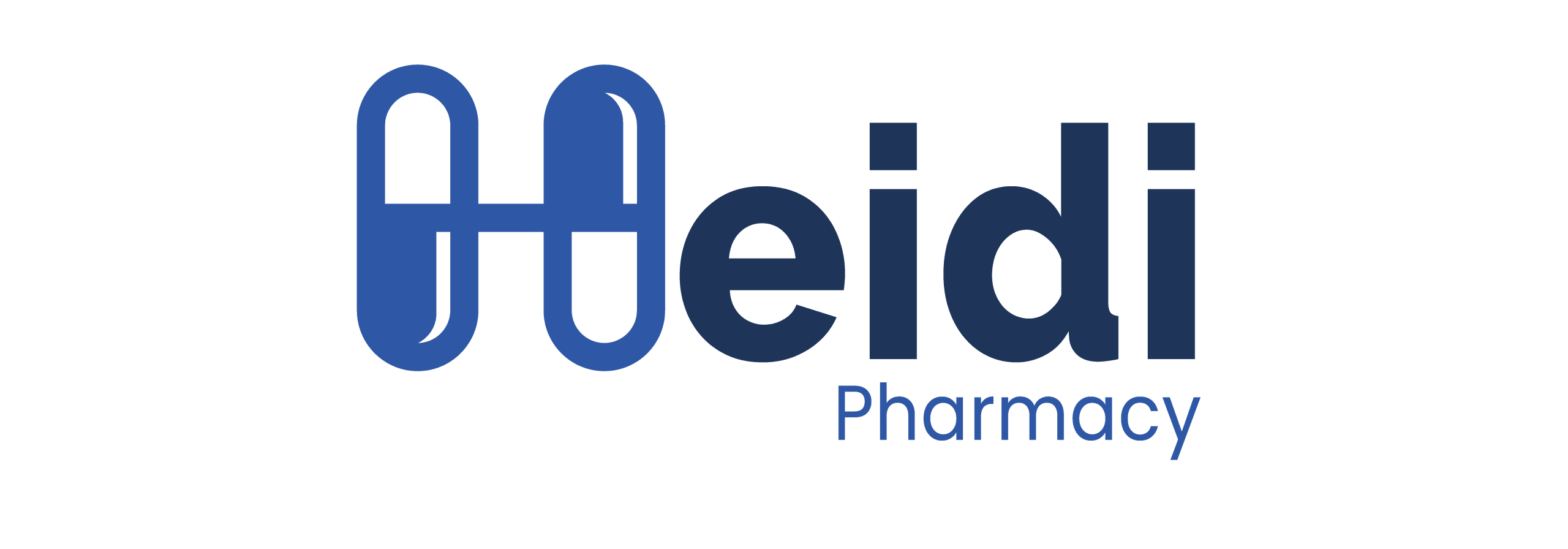
Longevity and general well-being depend on heart health maintenance. The heart is the core component of your circulatory system, and its malfunction can result in a number of dangerous medical disorders, including heart failure, heart attacks, and strokes. Knowing how to take care of your heart, recognize early warning signs of disease, and utilize medications efficiently is crucial because cardiovascular diseases continue to be one of the world’s leading causes of mortality. However, cardiac problems like high blood pressure, heart failure, and high cholesterol are becoming more prevalent due to the rise in lifestyle-related risk factors such poor food, sedentary habits, stress, and heredity. This guide covers everything you need to know about heart health, including common drugs, natural supplements, dietary options, and how to prevent or treat heart failure and its symptoms.
Importance of Heart Health:
Heart health is the state in which the heart and the cardiovascular system as a whole operate at their best. Blood is efficiently pumped throughout the body by a healthy heart, providing nutrients and oxygen to the organs. However, a lot of people unknowingly suffer from diseases like high blood pressure or excessive cholesterol, which can damage arteries and raise the risk of heart attacks, strokes, or heart failure. Unhealthy diets, genetic factors, smoking, obesity, and lack of exercise can all have a negative impact on heart health. Early detection depends on regular checkups, which include monitoring blood pressure and cholesterol levels.
Avoiding heart disease is only one aspect of heart health; another is being proactive in maintaining your cardiovascular system in optimal condition. Heart failure, heart stroke, and coronary artery disease are among the issues that can be avoided when your heart is functioning normally. In order to prevent serious conditions and increase life expectancy, early intervention and appropriate management are essential.
Recognize Heart Failure Symptoms:
Heart failure is a sign that the heart isn’t pumping blood as effectively as it should, not that the heart stops functioning. Early detection of heart failure symptoms is essential for quick treatment and better results. The following are the common heart failure symptoms:
- Persistent weakness and fatigue.
- Breathing difficulties while lying down or performing regular tasks.
- Ankles, feet, legs, or abdomen swelling.
- Fast or irregular heartbeat.
- Persistent wheezing or cough with pink or white blood-tinged mucus.
Ignoring these signs of heart failure could lead to congestive health failure. Therefore, it’s critical to consult a cardiologist right away if you observe any of these symptoms.
Medications in Managing Heart Health:
Numerous treatments are available in modern medicine to help manage cardiovascular problems. In order to stabilize cardiac function and stop additional damage, blood pressure medications, high blood pressure medications, and other medications are essential.
- Blood Pressure Medications:
One of the most crucial actions in preserving heart health is controlling high blood pressure. High blood pressure can harm arteries and cause problems including heart attacks, strokes, and heart failure if it is not treated. The common types of blood pressure medications include,
- ACE Inhibitors and ARBs
- Calcium channel blockers
- Beta-blockers
- Diuretics
These blood pressure medications aid in lowering heart rate, removing extra fluid, and relaxing blood vessels. However, there are side effects with heart medications to be aware of, just like with any other prescription.
- Blood Pressure Supplements:
Blood pressure supplements may be used as preventative measures or in addition to prescription medications for certain people. These supplements, which are frequently mineral-rich or plant-based, are designed to lower blood pressure and support vascular function naturally. The popular blood pressure supplements include,
- Magnesium helps in relaxing blood vessels
- CoQ10 to support energy production in heart cells
- Omega-3 Fatty Acids are good for heart health.
- Garlic Extract used to lower blood pressure and cholesterol
- Potassium balances sodium levels.
Even though blood pressure supplements are usually safe, you should always get a cardiologist’s approval before beginning to take them, particularly if you are currently taking prescription blood pressure medicine.
- Maintain Cholesterol Levels:
High cholesterol levels, particularly LDL (bad cholesterol), can narrow blood vessels and clog arteries, resulting in serious conditions like heart attacks and strokes. Lowering cholesterol and preserving your heart health can be achieved with lifestyle changes in diet and medications.
Consistent effort is necessary to maintain balanced cholesterol levels, including:
- Consuming a diet that is heart healthy.
- Regular exercise
- Limiting alcohol and avoid smoking
- Take the prescription drugs, if required.

Heart Healthy Diet for a Cardiovascular Wellness:
Medications alone aren’t sufficient. Both the prevention and treatment of heart disease depend on eating a heart-healthy diet. Blood pressure, cholesterol, and weight can all be lowered with a diet rich in heart-healthy foods.
Eating more heart healthy foods regularly can boost your immune system, enhance energy, and prevent heart strokes naturally. The following are the heart-healthy foods,
- Berries are rich in antioxidants
- Salmon full of omega-3 fatty acids
- Leafy Greens contains with potassium and magnesium
- Beans provide fiber and protein without saturated fat
- Walnuts for cholesterol management.
- Fruits and Vegetables rich in vitamins, minerals, and fiber
- Whole Grains like Oats, barley, and brown rice help lower LDL cholesterol high levels.
- Lean Proteins available in fish, poultry, and plant-based proteins
- Healthy Fats can be found in nuts, seeds, olive oil, and avocados.
Trans fats, too much salt, and added sugars should be avoided because they can raise blood pressure and cholesterol levels.
Side effects of Heart Medications:
Even though heart drugs can save lives, they might result in unwanted side effects. Patients should monitor their reactions and discuss alternatives with their cardiologist if they are aware of the side effects of heart medications. The common side effects of heart medications include,
- Dizziness and lightheadedness
- Fatigue or weakness
- Nausea or gastrointestinal discomfort
- Coughing (especially with ACE inhibitors)
- Swelling from fluid retention
Always report to your cardiologist if you experience any strange symptoms. Changing to a different drug or modifying the dosage are common ways to manage these side effects of heart medications.
Heart Failure Treatments:
After a heart failure diagnosis, treatment usually consists of a combination of medication, lifestyle modifications, and sometimes surgeries. Today, there are a number of heart failure treatments that can be used to enhance quality of life, reduce disease progression, and improve symptoms.
- ACE inhibitors help in relaxing blood vessels and reduce pressure on the heart.
- Beta-blockers used to slow the heart rate and reduce blood pressure
- Diuretics help in reducing fluid buildup.
- Aldosterone antagonists help the body get rid of excess salt.
Depending on the condition’s severity and stage, a specialist cardiologist will usually customize a treatment strategy.
Congestive Heart Failure Treatment:
Congestive heart failure treatment may also require advanced therapies in advanced stages. They are,
- Implantable devices like pacemakers or defibrillators
- Cardiac resynchronization therapy (CRT)
- Left ventricular assist devices (LVADs)
- Heart transplants
When standard medications and lifestyle modifications are no longer effective, these congestive heart failure treatments are typically suggested.
Tips to Maintain Heart Health:
Medication, diet, exercise, stress reduction, and routine exams are all necessary to maintain ideal heart health. Every positive action matter, regardless of whether you have been diagnosed with heart failure, are taking proactive measures and managing LDL cholesterol high.
- Take medications as prescribed by the cardiologist and monitor for side effects of heart medications.
- Follow a heart healthy diet with heart healthy foods.
- Exercise regularly.
- Quit smoking and limit alcohol
- Monitor blood pressure levels and take high blood pressure medication if required.
- Consume blood pressure supplements.
- Consult your cardiologist regularly and discuss all symptoms.
- Stay hydrated and control the portion of your food to reduce the pressure on the heart.
When to Consult a Cardiologist:
A cardiologist is a medical professional who specializes in the diagnosis and treatment of heart-related disorders. They are essential for developing personalized therapies, prescribing medications, monitoring progress, and recommending lifestyle modifications to support heart health. Consult a cardiologist if you experience the following symptoms.
- Persistent high blood pressure
- Heart failure symptoms
- Diagnosed with heart stroke
- cholesterol high despite dietary changes
- Require guidance on heart failure treatments or high blood pressure medications.
- Monitor heart health condition.
Conclusion:
Keeping your heart healthy is a lifetime commitment that includes the proper balance of medication, lifestyle, and awareness. Every action, from managing blood pressure medications to being aware of the side effects of heart medications and adopting a heart-healthy diet, is essential to overall cardiovascular health. Whether you’re dealing with heart failure, taking a new high blood pressure medication, or blood pressure supplements, always keep communication open with your healthcare provider. Recognize heart failure symptoms early and don’t hesitate to seek advice from a cardiologist. The right knowledge, action, and support can make all the difference in achieving a healthy heart and a longer, happier life.


